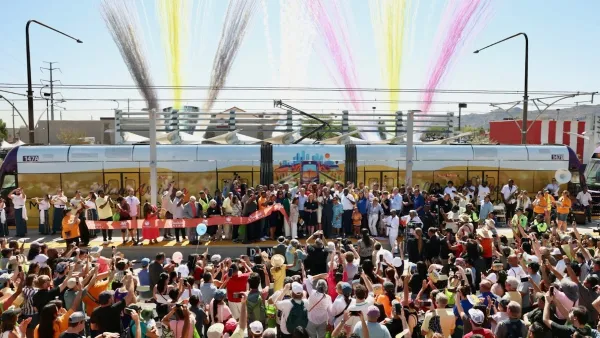Since 2011, the controversial Jerusalem Light Rail system has been a driving force behind the renewal and reintegration of some areas of the old city. In addition, the Jerusalem Business District is being planned as the city's new economic hub.
By Ricardo Mota for Cities of the Future
The Jerusalem stand at the Smart City World Congress last month brought to my attention an interesting reality about the ancient city.
Inaugurated in August 2011, the first light rail line in Israel has been a source of contention right from the start — financial, physical, and political. The budget for the project climbed dramatically from an initial estimate of €120 million to a final cost of around €925 million. The construction caused major disruptions in the city’s traffic flow and generated elevated levels of air and sound pollution that were vocally criticized by residents. And a 2009 report by the United Nations Human Rights Council described the new infrastructure as serving disputed settlements.
Fast forward to 2015 and the light rail moves around 140,000 passengers a day and has since become the heart of Jerusalem’s transportation network, connecting Muslim, Ultra-Orthodox and Israeli communities.
![Jerusalem Light Rail By Matanya – (Own work) [CC BY-SA 3.0]](/files/img/Jerusalem_Light_Rail02-800.jpg)
FULL STORY: Can Jerusalem’s Light Rail Pull the City’s Past Into the Future?

Maui's Vacation Rental Debate Turns Ugly
Verbal attacks, misinformation campaigns and fistfights plague a high-stakes debate to convert thousands of vacation rentals into long-term housing.

Planetizen Federal Action Tracker
A weekly monitor of how Trump’s orders and actions are impacting planners and planning in America.

San Francisco Suspends Traffic Calming Amidst Record Deaths
Citing “a challenging fiscal landscape,” the city will cease the program on the heels of 42 traffic deaths, including 24 pedestrians.

Adaptive Reuse Will Create Housing in a Suburban Texas Strip Mall
A developer is reimagining a strip mall property as a mixed-use complex with housing and retail.

Study: Anti-Homelessness Laws Don’t Work
Research shows that punitive measures that criminalized unhoused people don’t help reduce homelessness.

In U.S., Urban Gondolas Face Uphill Battle
Cities in Latin America and Europe have embraced aerial transitways — AKA gondolas — as sustainable, convenient urban transport, especially in tricky geographies. American cities have yet to catch up.
Urban Design for Planners 1: Software Tools
This six-course series explores essential urban design concepts using open source software and equips planners with the tools they need to participate fully in the urban design process.
Planning for Universal Design
Learn the tools for implementing Universal Design in planning regulations.
Heyer Gruel & Associates PA
JM Goldson LLC
Custer County Colorado
City of Camden Redevelopment Agency
City of Astoria
Transportation Research & Education Center (TREC) at Portland State University
Jefferson Parish Government
Camden Redevelopment Agency
City of Claremont



























